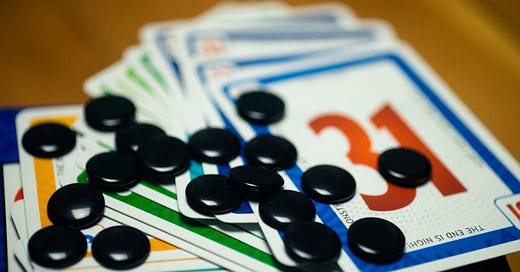Push your luck with this great little card game: No Thanks!
This little bidding game will force you into awkward decisions over and over.
Good morning! I hope this newsletter finds you well. I’m here a little later in the week this time around, and that’s because I’ve had some other projects that have consumed just a little bit of my spare time. (It actually consumed a lot, but I had a great time doing it.)
I’m here this week with a look at a whip-smart card game first published in 2004. No Thanks! is a push-your-luck and bidding game, and it’s one of the more interesting games I’ve played recently.
No Thanks! is the sort of game that seems so dreadfully simple that it won’t be captivating. There’s no stunning artwork. The game doesn’t have a great insert. (I would wager it has an awful insert. I could fit six more copies of the game in the box mine came in, although I guess that’s not the fault of the insert so much as the box.) The cards have some strange sayings on them that can add some extra confusion. The rules seem to trip people up in a strange little way. It’s very much a game that came out of Germany in the mid-2000s — it looks like it, it feels like it, and it sounds like it.
But you know what? That has no bearing on the quality of this game, and I’m here to tell you that this game of a small stack of cards and a pile of little black chips is one of the best gaming experiences I’ve had this year. (Yeah, yeah. I know, it’s only January. As of writing, there are over 11 months remaining for me to change that decision.)
See, this is a simple game. You’re going to give every player some of those chips. The number varies based on the number of players in the game, but everyone has an equal amount. You’ll also remove nine cards from the deck, which runs from three to 35. The game starts with a player flipping over a card, and subsequent players decide if they want to take the card, thereby gaining points equal to the card value (which are bad! You don’t want points!) If a player doesn’t want to take the card (and you don’t want points, so you really generally don’t want cards), they’ll place one of their chips on the card. When you take a card, you gain any chips on it, enabling you to potentially take fewer cards in the future.
There’s one major twist I haven’t mentioned yet: If you have a run of numbers, you’ll only take points for the lowest card in that run. As an example, if you have 30 and 32, you’ll have to take 62 points, but if you have 30, 31, and 32, you’ll only take 30 points. Nice, right? I thought so. But remember, nine cards are removed each time you play the game.
There are several very interesting things at play here. First, you’ll quickly find yourself taking cards if they are worth fewer points. It can be appealing, because you’re basically accepting a small number of points instead of a larger number of points, and you’re putting somebody else in the position of having to flip over the next card. But points are still points, and you’ll next find yourself taking a higher number because there are a bunch of chips on it, and you’re low on chips.
Deciding when you’ll take a card is an interesting exercise. It’s different for every player, and as you play more, you’ll find yourself considering the situation at the table, too. Consider this situation: Say you’ve got 30 and 32, and 31 is the next card, and it’s your turn to take it or pass, and there’s just one chip on it. That 31 could give you a 32-point swing in your favor if you take it, but you’re low on chips, and everyone else has a little bit of a stockpile. (They took your chips — let’s face it.) Should you let the card go around the table, giving everyone else a chance to pass but risking somebody else picking it up? Or should you take the card at first offering, knowing that it’ll be a great point swing for you?
There are often awkward decisions when you play No Thanks!, and that’s what makes this such a great little game. Despite those awkward decisions, it’s dead simple, and it takes just a minute to learn how to play. I always have time for a game like that.
Thanks for reading Don’t Eat the Meeples! I just passed one of my personal goals for the subscription count for this little newsletter, and i’m really excited to do something to commemorate. What will I do? I don’t know! I’d love any ideas you might have. Maybe I’ll start talking about some of my favorite games of all time. I don’t know.





